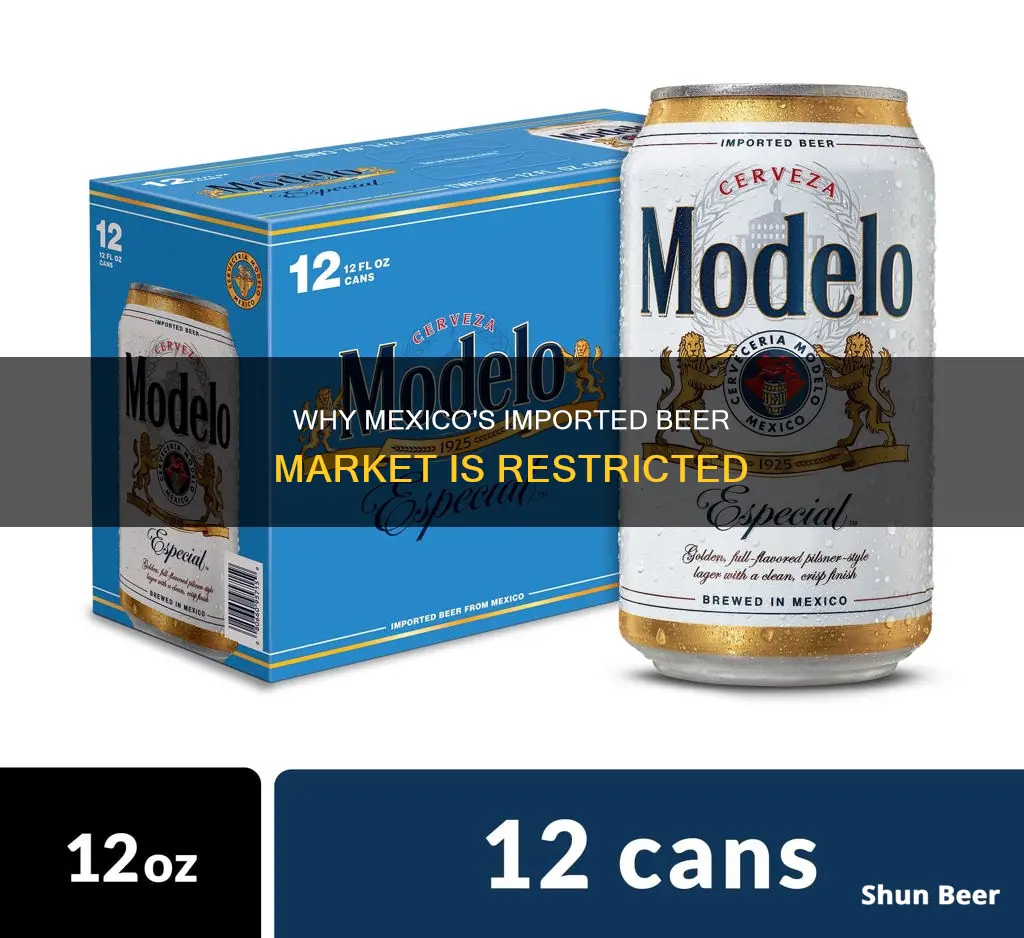
Importing beer into Mexico is a complex process. It requires registering with the Servicio de Administración Tributaria (SAT) and enrolling in the Padrón de Importadores (or Registry of Importers). Labelling requirements are strict and must include specific information in Spanish, such as the name of the product, type, net content, country of origin, importer's name and address, alcohol content, and health warnings. The process also involves working with shipping companies, customs clearance, and distribution solutions. It is recommended to form a company in Mexico to streamline the process and reduce costs.
What You'll Learn

Labelling requirements for beer in Mexico
In 2016, the Mexican government implemented revised labelling requirements for all alcoholic beverages imported, manufactured, and sold in Mexico. These rules are officially known as Norma Oficial Mexicana (NOM-142-SSA1/SCFI-2014) or "NOM 142" for short. The new requirements were introduced in response to the growing issue of alcohol abuse in Mexico and the associated health problems.
From March 24, 2016, all alcoholic beverages, including beer, imported, manufactured, and sold in Mexico must meet the following labelling requirements:
- Name or generic name (e.g. "beer" or "wine") and trademark of the product
- Name, corporate name, and legal address of the producer and/or distributor
- Country of origin, including captions such as "Made in __" and "Product of __"
- Lot identification with a code that allows for traceability
- "Best-before" date, which must include at least the day and month for products with a shelf life of less than or equal to 3 months, or the month and year for products with a longer shelf life
- Alcohol content (percentage of alcohol by volume)
- Energy content, expressed in either kilojoules (kJ) or kilocalories (kcal)
- List of ingredients, including those that cause hypersensitivity or present allergy concerns
- Cautionary notes, such as "Excessive consumption of this product may be harmful to human health"
- Symbols discouraging alcohol abuse, underage drinking, alcohol intake by pregnant women, and drunk driving. These symbols must be displayed on both the packaging and individual labels, and must be visible at all times
In addition to the above, alcoholic beverage producers must also comply with production standards outlined in NOM 142, which came into force on July 21, 2015. These standards include requirements for the quality of raw materials used and measures to ensure that products are not impermissibly altered during processing, packaging, or marketing.
Metro Gift Card Beer Run: What You Need to Know
You may want to see also

Registering as an importer in Mexico
Official Register of Importers:
Firstly, all Mexican importers must register and be listed with the Official Register of Importers (Padrón de Importadores), which is maintained by the Secretariat of Finance and Public Credit (SHCP). This registration is mandatory for tax purposes. The SHCP also oversees special sector registries for importers of specific goods, such as agricultural products, textiles, chemicals, electronics, and auto parts.
Customs Declaration Form:
The basic Mexican import document is the Customs Declaration Form for customs clearance (Pedimento de Importación). This form is required for all commercial crossings into Mexico and must be accompanied by supporting documentation.
Commercial Invoice and Supporting Documents:
Along with the Pedimento, importers must provide a commercial invoice in Spanish, a bill of lading, and documents demonstrating compliance with Mexican product safety and performance regulations. If applicable, additional documents may include guarantees of payment for undervalued goods.
Use of Authorized Representatives:
Importers can dispatch their goods through an authorized legal representative who meets certain technical requirements and has the necessary experience. Mexican customs brokers can facilitate the clearance of products through customs, but it is important to ensure total compliance with Mexico's strict customs regulations.
North American Products and USMCA:
Products qualifying as North American under the United States-Mexico-Canada Agreement (USMCA) require a minimum set of nine data elements to prove origin and receive preferential tariff treatment. This certification can be issued by the importer, exporter, or producer, and it does not need to follow a specific format.
Sector-Specific Requirements:
Certain sectors in Mexico have specific requirements. For instance, importers of textiles, apparel, and footwear must be registered in the Padrón for these products. Additionally, the Mexican government has implemented measures to protect the local industry, such as reference prices and a five-day waiting period for imports.
NOM Certification:
If you are importing electrical goods into Mexico, you must comply with the Norma Oficial Mexicana (NOM) standards. This certification verifies that imported goods meet Mexican government standards for safety, quality, and environmental protection. The process involves providing test results and legal documents to a NOM-certified body.
Mexican Tax Administration Service (SAT) Registration:
As an importer, you must register your company with the Mexican Tax Administration Service (SAT) and obtain a tax ID number (RFC) and digital signature (e.firma). This is a crucial step in the import process.
Labelling and Packaging Requirements:
Ensure that your goods meet Mexico's labelling and packaging requirements. Include necessary information in Spanish, such as product specifications, safety instructions, and warranty details.
Payment of Value-Added Tax (VAT):
Be prepared to pay a 16% VAT upon importation. Using a certified and experienced broker can help facilitate customs clearance and avoid delays or penalties.
By following these steps and staying informed about Mexico's import regulations, you can successfully register as an importer and navigate the process of importing goods into the country.
Tennessee Memorial Day Beer Buying Guide
You may want to see also

Taxes and duties on imported beer in Mexico
Importers of beverage alcohol products must first register in the Registro Federal de Contribuyentes (Federal Taxpayers Registry or RFC) before commencing business. This process is completed with the Servicio de Administración Tributaria (SAT).
Importers must then enrol in the "Padrón de Importadores" (or Registry of Importers) and also in the "Padrón de Importadores de Sectores Específicos" (Registry of Importers in Specific Sectors). This last requirement is applicable to importers of various products, including wines, spirits, beer, cigarettes, and denatured alcohol products.
For enrolment in the "Padrón de Importadores", importers must apply online, filling out the application titled "Solicitud de Inscripción al Padrón de Importadores". To complete this process, the importer is required to have an advanced electronic signature issued by SAT and an active RFC. The importer will also be required to register all of the Customs brokers that will clear shipments on their behalf.
After enrolment in the "Padrón de Importadores", the importer should proceed to register in the "Padrón de Importadores de Sectores Específicos" by filling out the SAT registration form as well as submitting company documents attesting to the company's establishment (e.g. act of incorporation), a copy of the requestor's ID, and a power of attorney, if applicable.
Once the necessary registrations are completed, Mexican law permits only customs brokers to file requests for the clearance of goods through Customs. Clearance is done electronically, through a system called SAAI (Sistema Aduanero Automatizado Integral).
Customs brokers must submit an Import Declaration (Pedimento de Importación) to Customs through the SAAI system. The Pedimento is then validated by Customs. Once the Pedimento is validated, the customs broker pays all applicable duties and taxes on behalf of the importer. The Pedimento is then presented to a Customs official who reviews the documentation and approves/disapproves it. An inspection may be done subsequently (these are done on a random basis) and then final clearance is granted.
All alcoholic beverages sold in Mexico are subject to Mexico's 16% value-added tax (VAT). In addition, alcoholic beverages are also subject to the Impuesto Especial de Productos y Servicios or IEPS (Special Tax on Products and Services). This tax may vary from 25 to 160 per cent depending on the product.
Buying Beer in Maryland: Supermarket Availability Explored
You may want to see also

Shipping imported beer to Mexico
If you are looking to import beer into Mexico, there are a few steps you should follow to ensure the process runs smoothly.
Firstly, you must choose the type of beverage you wish to export and obtain a classification code from the Harmonized Systems Committee (HSC). Send them a photo of your beverage, along with a list of ingredients, to get approved. It is also recommended that you form a company in Mexico, as this will save you time and money. Offshoring or using a third party is an option, but it is likely to be more expensive.
The next step is to consult the tax authority, Padron de Importadores, which provides a list of businesses that are authorised to import. This will give you an idea of how much you will need to pay in terms of importing costs and taxes. You should then organise a shipping company to transport your beer in containers to Mexico, ensuring that the containers are insured.
Once your shipment arrives in Mexico, a Mexican customs broker agent will need to receive a Bill of Landing (Conocimiento Embarca). The agent will verify the container against the information you provided, including correct labelling, ingredients, and the amount of beer. Once you have the green light, you must pay the importation cost and taxes and receive a ticket of authority from the Customs Broker. Your beverage will then go through a customs clearance (Despacho Aduanero).
For distribution, you can either use a third party (Comercializadora) or form your own company in Mexico and use a storage area (Almazen). It is worth noting that you do not need a big team in Mexico, as distribution depends on your importation strategy.
It is also important to be aware of any additional requirements from the Alcohol and Tobacco Tax and Trade Bureau (TTB), the Federal Food and Drug Administration (FDA), and the Customs and Border Protection (CBP). For example, you may need to apply for a Federal Basic Importer's Permit and obtain a Certificate of Label Approval (COLA) for each unique product/label.
By following these steps, you can successfully navigate the process of shipping imported beer to Mexico.
Where to Buy Rainier Beer: A Guide
You may want to see also

Distribution of imported beer in Mexico
The distribution of imported beer in Mexico is a complex process that involves various factors and stakeholders. Mexico's beer imports have been witnessing a steady decline in recent years, with the import volume dropping to 12.8 million liters in 2023, from a high of 26 million liters in 2021. Despite this decrease, the value of beer imports into Mexico remains significant, totalling over 16 million US dollars in 2023.
The United States is the leading country of origin for imported beer in Mexico, with an import value of approximately 11.372 million US dollars in 2023. Germany follows as the second-largest importer, contributing 1.82 million US dollars worth of beer imports to Mexico in the same year.
Mexico's beer exports far exceed its imports, with a difference of around 5 billion US dollars in 2023. This highlights the country's strong position as a net exporter of beer, with a total export value of 5.8 billion US dollars in the same year.
The distribution of imported beer in Mexico involves coordination between importers, distributors, and retailers. Importers play a crucial role by bringing in beer from countries like the United States and Germany, adhering to the necessary regulations and permits. Distributors then take on the task of transporting these imported beers to various parts of the country, ensuring they reach retail outlets, such as liquor stores and supermarkets.
To comply with Mexican regulations, importers must obtain the necessary permits and register as alcohol dealers. They are also responsible for paying applicable federal excise taxes and duties, which are collected by the country's customs and border protection authorities. By following these procedures, importers and distributors can ensure a steady supply of imported beer to meet the demands of Mexican consumers who appreciate a diverse range of beer options.
Beer Buying in Washington: Before 6am?
You may want to see also
Frequently asked questions
There are several requirements for importing beer into Mexico. Firstly, you must obtain a classification code from the Harmonized Systems Committee (HSC) by submitting a photo of your beverage and a list of ingredients. Secondly, it is recommended to form a company in Mexico to save time and money. Thirdly, you must register with the tax authority (Padron de Importadores) and find out the applicable taxes and costs. Fourthly, organise shipping to Mexico and ensure the containers are insured. Finally, once the ship arrives, a Mexican customs broker agent will need to receive a Bill of Landing and verify the contents of the container before granting clearance.
Labels on imported beer in Mexico must include the following information, in Spanish:
- Name/brand name of the product
- Type of product (e.g. malt beverage)
- Net content (in metric units)
- Country of origin
- Name/company name and address of the importer
- Alcohol content (followed by “% alc. vol.")
- Warning statement: "El abuso en el consumo de este producto es nocivo para la salud" [Abuse of this product is hazardous to your health], as per Article 218 of the General Health Law
- Additional statements for beverages containing aspartame or 50g or more of sorbitol
- A list of ingredients in decreasing order of percentage of the total composition for specialty products and cocktails
Forming a company in Mexico is not mandatory, but it is recommended to save time and money. Offshoring or using a third party is an option, but it tends to be more expensive.
All alcoholic beverages sold in Mexico are subject to a 16% value-added tax (VAT). Additionally, alcoholic beverages are subject to the Impuesto Especial de Productos y Servicios (IEPS), or Special Tax on Products and Services. The specific tax rates depend on the alcohol content of the beverage.
There is no specific mention of quantity limits for importing beer into Mexico. However, it is important to adhere to the labelling and tax requirements for each imported product.







